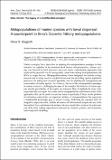Metapopulation of marine species with larval dispersal : a counterpoint to Ilkka's Glanville fritillary metapopulations
Abstract
Marine ecologists have been slow at adopting the metapopulation paradigm in their research. As explained in the landmark book “Marine Metapopulations”, marine ecology was focused on local processes and used mainly experimental approaches that neglected the potential role of demographic connections among local populations, but this is no longer the case. Metapopulation theory is now integrated into marine ecology research and is being used as a helpful framework for describing spatial population processes, for asking new research questions, and for planning the management and conservation of marine species. Nevertheless, the use of the metapopulation paradigm in marine sciences is challenging because of the complex life histories of marine species and the peculiarities of the marine environment. Here, I highlight the many challenges faced by ecologists who study marine metapopulations and mention some of the approaches that can be used to overcome them. In particular, I focus on the problem of estimating connectivity, an important attribute of metapopulations that represents a fundamental knowledge gap in marine ecology. Following the repeated calls for integrative approaches that combine all sources of information I propose the use of the Hierarchical Bayesian framework and provide an example that considers the joint analysis of the three leading approaches in connectivity research, genetics, microchemistry and biophysical modelling.
Citation
Gaggiotti , O E 2017 , ' Metapopulation of marine species with larval dispersal : a counterpoint to Ilkka's Glanville fritillary metapopulations ' , Annales Zoologici Fennici , vol. 54 , no. 1-4 , pp. 97-112 .
Publication
Annales Zoologici Fennici
Status
Peer reviewed
ISSN
0003-455XType
Journal article
Description
I thank the support of the MASTS pooling initiative (The Marine Alliance for Science and Technology for Scotland). MASTS is funded by the Scottish Funding Council (grant reference HR09011) and contributing institutions.Collections
Items in the St Andrews Research Repository are protected by copyright, with all rights reserved, unless otherwise indicated.

